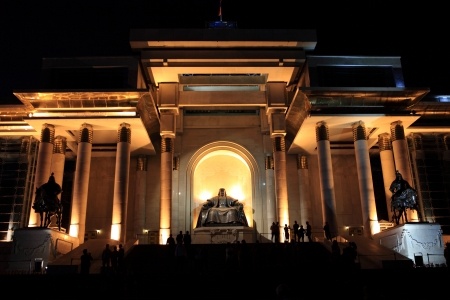6 October, 2015
Mongolia’s economic and business prospects were promising until about two years ago. In fact, the country was high on the list of prospective destinations for global investors seeking access to natural resources. There were several main reasons for this optimism with relative political stability the most important.
For the first time the Democratic Party controlled the three major government institutions (the Presidency, Parliament and the Ulaanbaatar City Council). Coinciding with this, coal and iron ore exports to China were growing rapidly, Rio Tinto’s Oyu Tolgoi mine was about to become operational, the real estate market was booming and GDP growth rate was in the high teens. International institutions were predicting for these high GDP growth rates to continue, further boosting confidence.
But since then the climate has changed rapidly, as the economy suffered from two quick blows which threw the country into a new period of uncertainty.
Externally, bulk commodity prices for coal and iron ore took a sudden sharp downturn. Although coal exports rose to 7.25 million tons in the first five months of 2014 compared to 6.33 million tons in the same period a year ago, the value of the coal exports fell to US$355.3 million from US$448.6 million from the same period last year.1
At the same time, the government made a number of decisions related to Foreign Direct Investment (FDI) which shook foreign investors’ confidence and was seen as hostile to their interests. The consequences were immediate. In response to China state-owned CHALCO’s (also known as the Aluminum Corporation of China Limited) bid in 2012 to take over South Gobi Sands (SGS), a major coal producer based in Mongolia, the government quickly passed the Strategic Entities Foreign Investment Law (SEFIL), which limits foreign investment and ownership in the strategic sectors of mining, banking and communications. The intention was to prevent foreign state-owned enterprises (SOEs) from gaining control of key sectors of the economy. Unfortunately, because of the way the law was written and passed, SEFIL made it difficult for all investors, not just SOEs.
Additionally, a breakdown in attempts to resolve the tax dispute between the government and with Rio Tinto on the Oyu Tolgoi (OT) copper/gold mine generated greater uncertainty amongst investors. The dispute in effect halted the Phase II underground mine development which would contribute 80% of the mine’s profits2 causing a ripple effect through the economy, which resulted in layoffs both on the project (2,000 to date) and throughout the supporting supplier/service sectors.
With investors already on the sidelines watching developments concerning the Rio Tinto situation, the government unilaterally and without investigation cancelled more than 100 mining licenses that were granted under the previous administration, in order to combat corruption.
The consequences of these actions are obvious. FDI is down by over 80% from its peak in 2011 and the Mongolian tugrik (MNT) has reached an all-time low against the U.S. dollar, dropping 45% over the last two years.
The vast majority of FDI had been targeted at the mining sector, which had been the driving force behind growth in the real estate, retail and service sectors. As a result, these sectors are also suffering a downturn, especially the real estate sector, which itself is also very dependent of FDI.
Taking Steps to Move Forward
In order to address and reverse the dire consequences of their past actions, the government has taken several measures to create a friendlier environment for potential investors. Among these:
- The SEFIL has been amended to solely target SOEs. As required by the less hostile Investment Law passed by the State Great Khural (Parliament), the government has appointed a nine-member Investment Council which will be responsible for reviewing tax stabilization and investment agreement requests. Council members come from both the private sector and the government. To date, about 95 foreign-invested companies have made inquiries since the new law went into effect, according to Mr. S. Javkhlanbaatar, Director General of the Foreign Investment Regulation and Registration Department at the Ministry of Economic Development (MED).
- Acknowledging the damage being done to the Mongolian economy by the OT dispute, the government has been trying to fast track the resolution of outstanding disputed issues. The Prime Minister has even gone so far as to issue an open letter stating the government’s commitment to settle the dispute. There is no doubt amongst all parties that the dispute will be resolved quickly. The major outstanding issue was the government’s claim for outstanding back taxes of US$130 million. Just recently in September, both sides reached an agreement on an outstanding tax amount of US$30 million. Although there are still some other outstanding issues such as the cost overruns of Phase I and the financing requirement for the Phase II underground mine, these other issues will quickly be resolved by the end of 2014. Due to the layoffs that have already taken place, it will then most likely take a 4-6 month ramping up period to bring the appropriate staff back on board for Phase 2, which should then be in full swing by mid-2015.
-
In a broader attempt at reform, the government has initiated a detailed review to reassess the role government should have in the private sector. This was initiated by the President under his “From a Big Government to a Smart Government” initiative. This
The nationalist Members of Parliament will mount a public campaign against these proposed mining related law amendments, but the government appears to be committed to amending the above mentioned laws to make the business environment in Mongolia more FDI friendly.
There are a number of other positive developments underway, which should encourage FDI and stimulate the economy:
-
FDI from China: China is Mongolia’s biggest trading partner, receiving over 90% of its exports.3 The Chinese government is encouraging its SOEs to expand internationally and for some, Mongolia is becoming the logical choice. The Bank of China has recently received the first branch operating license issued by the Mongolian government to a foreign- owned bank. This will provide a more reliable and secure source of financing and greater level of confidence for Chinese SOEs and other Chinese FDI to come to Mongolia.
-
FDI Targeting Infrastructure: A restraint to FDI into Mongolia’s mining sector is the lack of supporting infrastructure — rail, roads and power. During China’s President Xi Jinping’s recent state visit at the end of August, China committed to providing US$1 billion in foreign aid in 2015 to be used in building and modernizing Mongolia’s infrastructure. Russia’s President Putin, during his state visit at the beginning of September, committed to improving and expanding the current rail system in Mongolia. These commitments to expand and develop Mongolia’s infrastructure will create more economically viable investment opportunities in rural areas where most of the mineral resources are located.
-
FDI for Connecting Pipelines and Power Lines: During the recent Council of Heads of the Shanghai Cooperation Organisation Member States meeting, the Mongolian President hosted the first trilateral meeting of the three state heads of Russia, China and Mongolia. Major initiatives have been identified and were proposed to build pipelines and power lines through Mongolia to supply Russian oil, gas and power to China. These projects will result in large inflows of FDI and will create major opportunities for local suppliers/service providers and employment. As Russia turns to the Asian market, primarily China, President Vladimir Putin has called for the three countries to increase trilateral contacts and cooperate on joint projects in infrastructure, mining and energy.
-
Recent FDI in Mongolia: One measure of confidence is when international financial institutions provide financing to foreign investors. The European Bank for Reconstruction and Development (EBRD) has just closed a private placement with Vancouver based Altan Rio Minerals which explores large gold and copper deposits in Mongolia. Asian Development Bank has also signed a US$125 million loan with the government to build road infrastructure, which will support mining in western Mongolia. In another major FDI initiative, POSCO, South Korea’s top steel maker, recently announced that they will form a joint venture with Mongolia’s MCS Group to build a synthetic natural gas (SNG) plant in Mongolia.
This presidential initiative reflects the country’s priority to reassess government’s role in Presidential initiative reflects business activities and operations and to limit its future role in private sector activities. One of the resulting policy shifts will be for the government to establish a more effective and business friendly royalty regime for mining activities and limit its current requirement to have an equity position in major strategic mining deposit development projects.
This government review of government institutions will focus on establishing a business friendly environment by
developing and implementing the appropriate policy, legal, regulatory and compliance frameworks. Also, it will allow the private sector to manage its operations effectively as long as they operate within these frameworks. The rules by which businesses must operate will be clearly established and consistently applied without government direct involvement, resulting in less (if any) government minority equity positions in private sector operations and day-to-day
interference.
Government’s management role of the economy will be through policy and regulatory compliance monitoring and management. Through an effective and appropriate royalty framework for the mining sector, government revenues will be higher and more consistent as FDI increases in this business friendly environment.
- As a result of the damage caused of unilaterally cancelling mining licenses, the government has this past summer overturned last year's law. It has now started a tendering process to return the exploration/mining licenses, taking into account past investments. In addition to this, Mongolia's government has recently publically confirmed that it intends to submit two additional bills to Parliament that will stimulate its mining sector and FDI.
The first of these would invalidate a 2010 law which suspended the issuance of new mining exploration licenses. Also, the government would change guidelines applied to the 2009 law which limited exploration and development of deposits near rivers and forests due to environmental concerns. The current law has taken a very broad brush approach to defining environmental issues. However, the proposed amendment will provide clearer definitions that must be met to effectively address environmental standards and concerns.
International investors have already expressed their support for these proposed amendments. One of the foreign investors in Mongolia Kincora Copper recently stated that Mongolia appears to have made a "steep change" in its approach to mining.
1
http://www.eurasiac.com/files/mongolia_weekly/15062014/mongolia_ weekly_15062014.pdf
2
http://covermongolia.blogspot.hk/2013/08/ot-underground-stop-causes- mass-layoffs.html
3
For further information, please contact:
Alex Horbasz, FTI Consulting
alex.horbasz@fticonsulting.com






